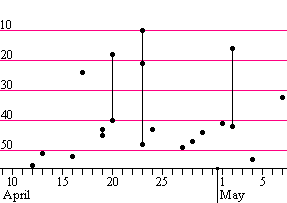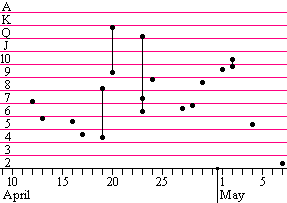Of the 55 Iraqis on the Centcom most wanted list and the 52 on the deck of cards, twenty are now in custody. It's not too soon to take a look at statistical trends and what they show us. Here are the latest versions of my two graphs (which can also be reached through the Ba'ath Poker button above):
Time of Capture vs Rank on the List of 55:

Time of Capture vs Rank in the Deck of 52:

As these graphs show, the pace of captures is slowing a bit. If we look at the 26 days (inclusive) from the first capture on April 12th to the last on May 7th, we find that 12 were captured in the first 13 days, only 8 in the last 13.
Even more disquieting is the sparsity of high-ranking captives. The list and the deck are quite different in detail, but similar over all. If we divide the list of 55 into thirds, we have 3 of the top 18 or 19, 3 of the next 18 or 19, and no fewer than 14 of the bottom 18 or 19. In fact, we have 14 of the bottom 16, very nearly a clean sweep. If we divide the top third in half, we have none at all of the top sixth (1-9) of the list of 55, just three (10, 16, 18) in the second sixth.
A few of those not captured are likely to be dead, most notably number 5 ('Chemical Ali', the King of Spades, by allied bombing), though number 12 (commander of the Republican Guard, the Jack of Clubs) was reportedly shot by Saddam for his troops' incompetence and lack of zeal, which sounds plausible. But that still leaves a lot of high-ranking Ba'athists on the loose. There is very little evidence that they are leading any sort of 'resistance movement', and they can't all have been killed by Allied bombing, though it's likely enough that we nailed one or two in the attempts to kill Saddam by bombing his bunker on the first day of the war and that restaurant on (I think) April 7th.
So what's going on? As I've remarked before, Ba'athist big fish presumably have greater access to money, guns, bodyguards, and plastic surgeons than the little fish, so perhaps they are just hiding more successfully. But big fish are also much more likely to be recognized by Iraqis and Americans, which is a huge disadvantage. It seems likely therefore that most of them are not in Iraq at all. Whether they are in Syria, France, Belarus, or some other country is the question. The sharp difference in capture rates between the top two-thirds of the list and the bottom third makes it look as if the Syrians (or whoever) have their own list, and are only willing to protect the Top 40 (approximately), not the Top 55. Allowing some of the little fish to be captured may even help the big fish escape -- not to mention reducing the risk of an American attack on Syria.
Posted by Dr. Weevil at May 09, 2003 10:57 AM